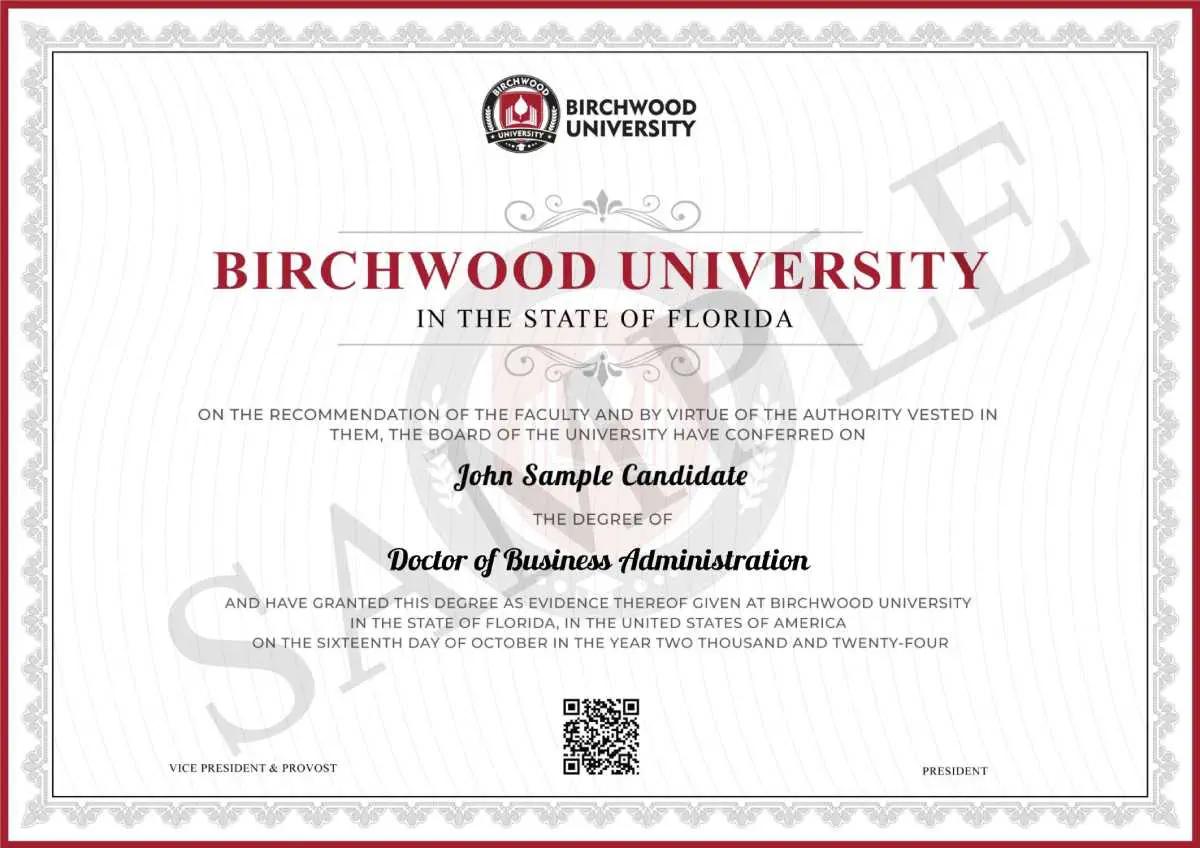Doctor of Business Administration
Doctor of Business Administration
The program focuses on technology transformation including data science and cybersecurity, preparing students for senior level executive positions employing the latest technology to realize organizational goals. The Birchwood University Doctor of Business Administration program is designed for experienced professionals who want to achieve an even higher level of mastery in business and management principles, putting theory into practice. Students will demonstrate mastery of leadership, communication, strategic thinking, diversity management, financial analysis, change management, and accountability skills necessary for successful managerial execution.
- Management Operations - work and perform in a changing global environment.
- Entrepreneurship - develop and grow organizations.
- Leadership - lead ethically in a multicultural environment.
- Innovation - effectively manage resources and understand the choices of society, businesses, and government.
- Technology - gather, organize, and report on information to stakeholders and use data in decision-making.
- Strategy - effectively and ethically manage the resources of individuals, organizations, and communities.
- International Global Practicum - immerse students in different cultures and apply their cumulative knowledge and skills in an international setting. This would allow students to work in-group settings within a multicultural global society and apply theoretical frameworks in a consultative capacity, to solve real business issues and challenges. Participation in the field program is voluntary with no cost to students.
- Research and Analysis: develop empirical research projects.
- Teaching: develop the skills to become effective teachers.

The Changing Business Landscape
The pace of change we are witnessing today is unlike anything we have seen in recent history.
Why choose Doctor of Business Administration from Birchwood University?
The Doctor of Business Administration at Birchwood University is a comprehensive online program which is tailored to the skills demanded by modern business leaders. The program is designed to enable professionals in leadership roles to think analytically and build problem-solving abilities alongside developing applied research skills. Our program is a strong suit for professionals seeking to attain a higher level of proficiency and command in business and management principles, both in theory and practice. Our graduating researchers will demonstrate mastery of leadership, communication, strategic thinking, diversity management, financial analysis, change management, and accountability skills necessary for successful managerial execution.
Admission Requirements
General Admission Requirements
- A copy of a valid government-issued photo identity card.
- A copy of an updated resume.
- Any document if not in English must be accompanied by a certified translated copy.
Additional Admission Requirements For Doctor of Business Administration
- Applicants must have earned a Bachelor’s and Master’s degree in business, information technology, management, organizational studies, or a closely related field from a regionally accredited college or university. A minimum Grade Point Average (GPA) of 3.00 or higher is required to be considered for admission.
- Work experience within a for-profit firm, non-profit organization, government agency, or non-governmental organization (NGO).
- Submission and evaluation of graduate school application including; undergraduate and masters academic transcripts and resume.
- Applicant interview if necessary as determined by Program Director.
- Applicants must submit an essay as to how earning a Doctor of Business Administration degree would advance your knowledge and contribute to your career goals?
- Transfer students must supply their high school transcripts and previous college or university transcripts.
Your Path to Admission
We evaluate candidates based on their educational background, professional performance, and openness to applications. Our goal is to identify motivated individuals with strong leadership potential and a passion for advancing in Doctorate in Business Administration.
Step 1
Online Application
Step 2
Online Assessment
Step 3
Personal Interview
Step 4
Documents Verification
Step 5
Final Committee Decision


Admission Application and Graduation Requirements
Application For Admission
Candidates seeking admission to the Doctor of Business Administration program at Birchwood University should complete the online application form and make the necessary payment. A non-refundable application fee of $150.00 through Credit Card/Bank Transfer payable to Birchwood University must be made by the applicants.
Applicants must submit all the requisite documents to be considered for admission. Shortlisted candidates will receive an email with further instructions. Candidates may expect regular updates and guidance from the admission agent to ensure your complete documents reach our office.
Doctor of Business Administration Graduation Requirements
To graduate from Birchwood University and to be honoured with the Doctor of Business Administration, the research scholars must:
- Complete coursework, meet the credit requirements as per the program and successfully defend the dissertation.
- Need to earn a minimum 3.0 cumulative GPA.
- Meet satisfactory academic progress.
- Fulfil all monetary obligations.
Doctor of Business Administration Course - Key Highlights
Earn a globally recognized online Doctor of Business Administration and propel your career to the next level.

Program Objectives
The Doctor of Business Administration Program is a practitioner-focused doctoral vita designed to develop advanced managerial competencies, cutting-edge technological proficiency, and transformative leadership capabilities. It prepares graduates to excel across diverse sectors—nonprofit organizations, for-profit firms, governments, and hybrid public/private enterprises—by equipping them with strategic decision-making, rigorous data analysis, and ethically informed governance. Beyond immediate practitioner roles, the program also nurtures capacity for scholarly inquiry, applied research, and teaching, enabling graduates to contribute to theory development and knowledge dissemination while solving real-world organizational challenges.
The program goals are:
- Goal 1: Master the necessary skills to communicate effectively, thoughtfully, and compassionately within the global management field.
- Goal 2: Apply, synthesize, analyze, and integrate knowledge of business, technology, and other fields to arrive at innovative solutions to organizational problems.
- Goal 3: Master the skills to employ technology towards organizational goals operating in a globalized society.
- Goal 4: Engage in decision-making ethically and compassionately.
- Goal 5: Master the ability to develop, analyze and communicate empirical scholarly work.
Program Curriculum
A summary of the courses you will learn during the program.
MAN 7600 | Managerial Valuation | 3 Credit Hours
ECO 7610 | Resource Economics | 3 Credit Hours
MAR 7615 | Digital Marketing | 3 Credit Hours
BUS 7620 | Business Analytics and Data Management | 3 Credit Hours
ACC 7625 | Managerial Accounting | 3 Credit Hours
MAN 7630 | Global Technology Management | 3 Credit Hours
QUA 7635 | Quantitative and Qualitative Research Design and Analysis | 3 Credit Hours
MAN 7640 | International Project Management | 3 Credit Hours
MAN 8645 | Management of Innovative Technologies I | 3 Credit Hours
MAN 8650 | Management of Innovative Technologies II | 3 Credit Hours
MAN 8655 | Predictive & Risk Analysis | 3 Credit Hours
DAT 9660 | Data Science Analytics | 3 Credit Hours
TEC 9665 | Technological Transformation Design and Leadership | 3 Credit Hours
TEC 9670 | Advanced Effective Technologies | 3 Credit Hours
TEC 9675 | Global Technology Cybersecurity | 3 Credit Hours
LED 9680 | Strategic Leadership | 3 Credit Hours
DIS 9800 | Dissertation Development I | 3 Credit Hours
DIS 9810 | Dissertation Development II | 3 Credit Hours
DIS 9820 | Dissertation Development III | 3 Credit Hours
DIS 9830 | Research Thesis/Dissertation Defense | 3 Credit Hours
Earn an Eminent Doctor of Business Administration Degree from
Birchwood University
Same Doctorate as On campus
Receive the same world-class education and global recognition as on- campus doctorates without the need to relocate.
Globally recognized US Degree
Birchwood University is licensed by the Florida Commission for Independent Education, Florida Department of Education.
Lifetime Alumni Status
Join an alumni network of professionals with as many in key leadership roles spread all over the globe.

Additional Information for Doctor of Business Administration Program
Frequently Asked Questions
For quick answers, browse our Frequently Asked Questions on the website



